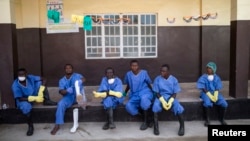The latest figures from the World Health Organization (WHO) on the Ebola outbreak in the three hardest-hit West African countries show there is cause for hope, says Tarik Jasarevic, spokesperson for the WHO.
"We are seeing some districts in all three countries of not having any case for weeks now," he said. "The number of new infections is leveling in many parts of [Sierra Leone, Liberia and Guinea].
WHO figures released Wednesday show that 8,414 people have died and 21,261 others are infected with the virus in the three Ebola hot zone countries. Roughly a week before, the numbers were in the same neighborhood at 8,153 deaths and 20,656 infections. And the week before that, there were 20,129 infections and 7,879 deaths.
The progress is the result of boosting the number of beds and the number of trained and equipped safe burial teams following a big spike in Ebola cases last August and September, Jasarevic said.
"We are now really in a position to hunt the virus, and to map transmission chains," he said.
But this hard-won progress is uneven and patchy, with continuous transmissions still occuring in western Sierra Leone and some parts of Guinea.
"We know that all three countries have sufficient capacity in terms of treatment: enough beds, enough laboratories, enough safe burial teams,” he said. “But these resources and these services are not always close to the areas where there is the most intense transmission…There is no place for complacency."
The head of the U.S. Centers for Disease Control and Prevention, Dr. Tom Frieden, voiced the same warning during a Tuesday meeting with public health officials and lawmakers Washington.
"Guinea has come close to controlling it [the epidemic] on two different occasions and maybe they got a little bit relaxed and dropped the ball, and it came roaring back," said Frieden.
Even with local community cooperation greatly improved, the WHO says it is crucial that member states remain vigilant and engaged -- and keep the endgame in mind.
"We have to come to zero cases and it will take some time and it will take resources to get there," Jasarevic said. "But we have to do it."
VOA's Mariama Diallo contributed to this report.




